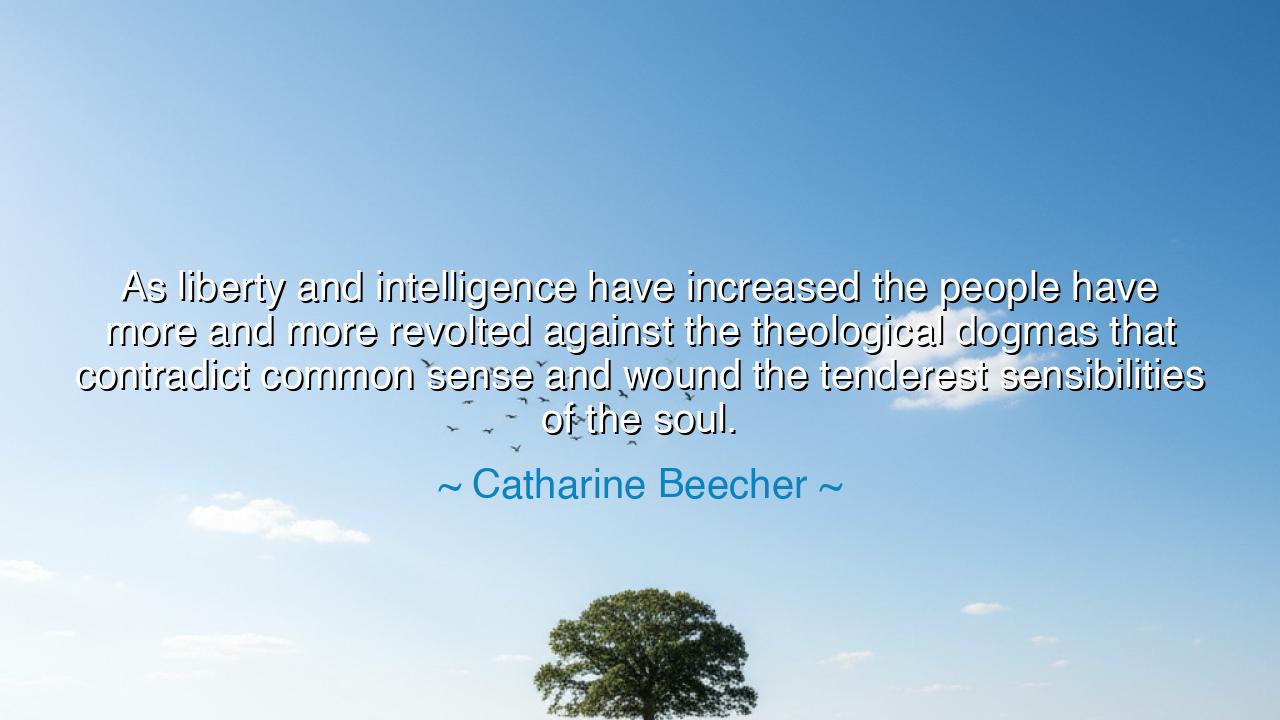
As liberty and intelligence have increased the people have more
As liberty and intelligence have increased the people have more and more revolted against the theological dogmas that contradict common sense and wound the tenderest sensibilities of the soul.






In the luminous and daring words of Catharine Beecher, pioneer of education and moral reform, we find both a challenge and a prophecy: “As liberty and intelligence have increased the people have more and more revolted against the theological dogmas that contradict common sense and wound the tenderest sensibilities of the soul.” In this statement, Beecher gives voice to the awakening of the human spirit — the great unfolding of conscience and reason that marked her age and continues into ours. Her words are not a rebellion against faith, but against blind belief, against doctrines that imprison the heart instead of enlightening it. She saw that as knowledge grows and freedom widens, the soul begins to demand truth that resonates with its own moral intuition — a truth that honors both reason and compassion, not fear and authority.
The origin of this quote lies in the 19th century, an era of both spiritual and intellectual upheaval. Catharine Beecher, born into a family of reformers and preachers, stood at the crossroads between tradition and progress. She was deeply religious, yet she believed that faith must evolve with understanding, and that human dignity requires liberty of thought. As women, educators, and thinkers began to claim their voice in public life, Beecher witnessed how intelligence — through science, philosophy, and moral reflection — began to erode the rigid dogmas that had long governed human belief. She saw that the divine spark within humanity cannot be silenced by fear of heresy or by the authority of old creeds. Thus, her words ring with both conviction and compassion: that the movement toward greater freedom and enlightenment is not a betrayal of God, but a fulfillment of the divine impulse to seek truth.
To revolt against theological dogma, as Beecher describes, is not to abandon the sacred, but to defend it from distortion. The dogmas she speaks of are not faith itself, but the hardened shells of ideas that once served humanity and later became chains. History is filled with such examples — times when institutions clung to power by demanding obedience instead of understanding. Consider Galileo Galilei, whose telescope revealed the heavens as they truly are, yet who was condemned because his discoveries contradicted the dogmas of his age. He, too, embodied Beecher’s truth: that when intelligence increases, humanity cannot help but rebel against ideas that contradict common sense and wound the soul’s tender sensibility — the natural yearning for truth and beauty.
Beecher understood that true liberty is not merely political, but spiritual. It is the freedom to think, to question, and to feel. When she speaks of “the tenderest sensibilities of the soul,” she is naming that sacred inner compass — the voice of conscience that knows cruelty, fear, and falsehood when it meets them. The human heart recoils from doctrines that preach condemnation instead of compassion, exclusion instead of love. As education spread and the mind of humanity expanded, Beecher saw this moral instinct reawaken — the revolt not of anger, but of spiritual conscience. For when knowledge deepens, people begin to see that true divinity cannot contradict justice, and true faith cannot despise reason.
Throughout history, such revolutions of spirit have defined the progress of humankind. The Reformation, though born in conflict, was a cry for conscience against authority. The abolitionist movement, which Beecher herself supported, was another revolt — against the blasphemy that slavery could ever be sanctioned by heaven. And in our own time, every struggle for equality, justice, and truth echoes this same divine rebellion. Beecher’s insight reminds us that enlightenment is not the death of faith, but its rebirth in higher form. For faith and reason, once seen as rivals, are in truth companions — each incomplete without the other.
The lesson of Beecher’s words is timeless: question boldly, but never lose reverence; seek truth, but never abandon love. When beliefs wound the heart or silence the mind, it is the duty of the awakened soul to rise against them — not in hatred, but in courage. Liberty and intelligence are gifts not only of the intellect, but of the spirit, and they must be used to heal what ignorance divides. In your own life, do not fear to examine what you have been taught; truth welcomes inquiry, for it has nothing to hide. Let your faith be living, not fossilized — let it breathe with compassion, evolve with understanding, and serve the flourishing of all life.
So, my child of reason and reverence, remember Catharine Beecher’s wisdom. The path of progress is not the destruction of belief, but its purification. As the mind grows in intelligence and the heart in freedom, hold fast to the truth that no sacred teaching should contradict common sense or injure the soul’s tenderness. The divine is not threatened by your questions — it is revealed through them. For the highest form of faith is not obedience, but understanding; not submission, but harmony between the heart’s love and the mind’s light. Walk in that balance, and you will honor both the heavens above and the humanity within.






AAdministratorAdministrator
Welcome, honored guests. Please leave a comment, we will respond soon